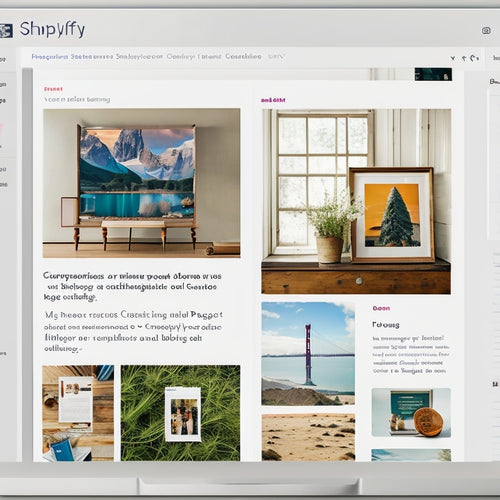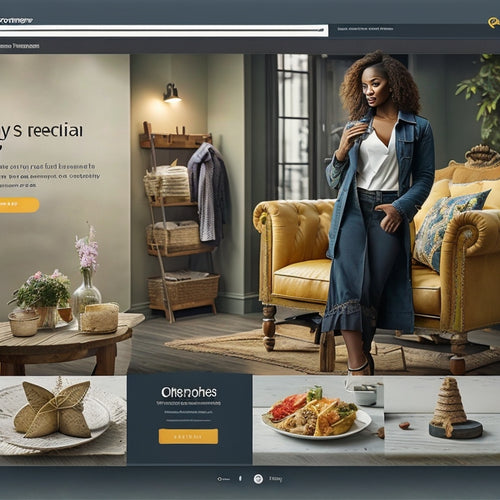
Etsy Pattern Vs Shopify: Find Your Fit
Share
You're deciding between Etsy Pattern and Shopify for your e-commerce platform. Both offer unique features, pricing, and payment gateways. Etsy Pattern is ideal for handmade or vintage items, with varying plans to suit different businesses. Shopify, on the other hand, provides tools for managing online stores, including inventory and marketing, starting at $5 per month. Consider your product type, brand identity, budget, and technical abilities to determine which platform fits your needs. Think about your target market and desired level of customization. Now, take a closer look at the details to uncover the perfect fit for your business.
Key Takeaways
• Consider your product type, brand identity, budget, and technical abilities when choosing between Etsy Pattern and Shopify.
• Etsy is ideal for selling handmade or vintage items, while Shopify offers more control over design and functionality.
• Etsy Pattern allows sellers to create custom websites for their businesses, but Shopify offers more advanced customization options.
• Compare payment gateways and fees, as Shopify Payments has lower transaction fees compared to third-party gateways.
• Determine your target market and whether you need advanced customization options to find the right fit for your business.
Platform Features and Pricing
When selecting an e-commerce platform, understanding the features and pricing of Shopify, Etsy, and Etsy Pattern is essential to determining which one aligns with your business needs and budget.
Shopify offers tools for managing online stores, including inventory, payments, shipping, and marketing, with plans starting at $5 per month.
Etsy, on the other hand, is ideal for selling handmade or vintage items, with varying plans to cater to different businesses.
Etsy Pattern allows sellers to create custom websites for their businesses.
In a platform comparison, Shopify is suitable for independent online stores, Etsy for selling handmade or vintage items, and Etsy Pattern for creating entry-level websites.
Consider your target markets and business needs to make an informed decision.
Payment Gateways and Fees
You'll need to take into account the payment gateways and fees associated with each platform, as they can greatly impact your business's bottom line.
Shopify Payments offers lower transaction fees compared to third-party gateways, and accepts common payment methods like ApplePay, GooglePay, VISA, Mastercard, and Amex.
On the other hand, Etsy Payments is supported in various countries and accepts payment gateways like ApplePay, GooglePay, PayPal, Klarna, Debit and Credit Cards, etc. Additionally, Etsy fees include a $0.20 fee per listed item and a 3.5% fee on the total sale amount, automatically deducted from your payment account.
When choosing between platforms, consider the transaction fees and supported countries to ensure a seamless payment experience for your customers.
Finding the Right Fit
Considering your product type, brand identity, budget, and technical abilities will help you determine which platform - Shopify, Etsy, or Etsy Pattern - best aligns with your business goals and needs.
You'll want to think about your target markets and whether you need advanced customization options. If you're selling handmade or vintage items, Etsy might be the way to go. However, if you're looking to create a custom website with more control over design and functionality, Shopify could be the better choice.
Etsy Pattern offers a trial period, allowing you to test its features and tools before committing. Weigh the additional tools and services each platform provides, such as payment gateways and marketing features, to find the one that best fits your unique business requirements.
Frequently Asked Questions
Can I Use Both Etsy Pattern and Shopify for My Online Store?
You can leverage a hybrid model by using both Etsy Pattern and Shopify, aligning your business strategy with each platform's strengths, but consider integration complexities and fees to guarantee a cohesive, profitable online store experience.
Do I Need Web Development Skills to Customize My Online Store?
"Measure twice, cut once" - when customizing your online store, you'll need some design flexibility, but code literacy isn't necessary; you can use drag-and-drop tools or hire a developer to get the job done, depending on your technical skills and budget.
Are There Any Limits to the Number of Products I Can Sell on Etsy Pattern?
You can list unlimited products on Etsy Pattern, enjoying flexibility in product variety, but be mindful of inventory management, as it's essential to keep track of stock levels to avoid overselling and maintain a seamless customer experience.
Can I Integrate Social Media Into My Etsy Pattern or Shopify Store?
As you navigate the digital landscape, imagine your social media integration as a bridge connecting your online store to a vast audience. Yes, you can integrate social media into your Etsy Pattern or Shopify store, leveraging Facebook Insights and Instagram Ads to amplify your online presence.
Is There a Way to Migrate My Existing Etsy Store to Shopify?
You can migrate your existing Etsy store to Shopify using data migration apps like LitCommerce or Matrixify, which sync your store's products, customers, and orders, ensuring a smooth shift with minimal downtime.
Related Posts
-
The Power Of Short-Form Video For Driving Ecommerce
Short-form videos have transformed the eCommerce landscape, becoming a vital tool for driving conversions and revenue...
-

What Is the Difference Between a Blog Post and A Page on Shopify
This article aims to provide a comprehensive understanding of the distinction between blog posts and pages on the Sh...
-

Should I Add Reviews to My Shopify Store
The inclusion of customer reviews in e-commerce platforms has become a topic of interest and debate among Shopify st...

